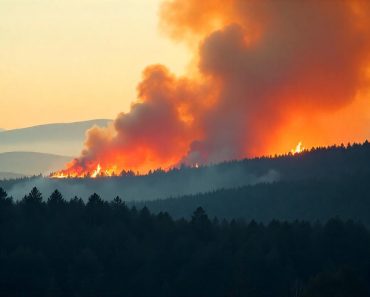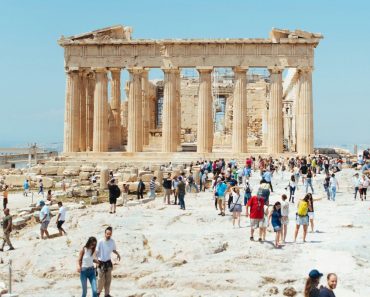Sunday, August 3, 2025
Greece is heading towards another summer fire season which will put its inhabitants and holidaymakers – particularly from the UK – to serious risk. Hotter temperatures contribute to dry conditions and make the country a top destination for wildfires, which can escape control and enter travel areas with little notice. With UK tourists planning or wanting to plan their visit, it is important that the safety measures and how to deal with these risks are kept in mind. This guide is filled with resources on what to do before visiting, how to stay safe during your vacation from registering for emergency alerts to recognizing wildfire-prone areas and making sure your summer trip provides only good memories.
Greece is a renowned vacation spot for travelers, especially from the UK, but the country faces significant natural disaster risks, making it essential for visitors to stay informed and prepared. Earthquakes, floods, and wildfires are common in Greece, and these events have caused widespread damage to communities and disrupted travel plans in recent years. With the summer months being particularly dangerous, travelers need to heed advice and take precautions to stay safe.
Understanding Greece’s Natural Disaster Risks
Greece’s geographic location, nestled in the Mediterranean, makes it prone to natural hazards. Earthquakes occur frequently in the region, as it lies on several seismic fault lines. Furthermore, Greece’s dry, hot summers create ideal conditions for wildfires, which can spread rapidly and are often difficult to predict. Floods can also occur, though they are typically associated with the winter months. Given the variety of these potential hazards, the country poses unique risks for visitors, especially from April to October.
Wildfires: A Major Concern for Tourists
Among the various natural disasters, wildfires are a particular concern for tourists traveling during the summer. The dry conditions, combined with high temperatures, make many parts of Greece highly susceptible to fires, which can escalate quickly. The UK Foreign Office has consistently highlighted the increased likelihood of wildfires during the summer months, particularly from April through October. These wildfires can quickly become uncontrollable, leaving both locals and tourists at risk.
Recent years have seen several large fires that ravaged popular tourist destinations, including areas in Crete, the Peloponnese, and Evia. This risk is compounded by the fact that wildfires can spread unpredictably, endangering regions that were once considered safe.
How to Stay Safe: Emergency Alerts and Preparedness
To safeguard against the threat of wildfires, travelers are advised to activate emergency alert systems in their mobile devices. The Greek government offers an Emergency Communication Service that sends out crucial notifications about natural disasters, including wildfires. Travelers should ensure they receive these alerts for real-time updates. Here’s how to activate the emergency alerts on your device:
For iPhone users: Navigate to the Settings app, tap on Notifications, and activate Emergency Alerts.
For Android users: Open Settings, select Notifications, then go to Advanced Settings and toggle on Wireless Emergency Alerts.
For Samsung users: Access Settings, choose Apps, then Messages, and under Notifications, ensure Emergency Notifications are enabled.
By enabling these alerts, travelers will be notified promptly if they are in an area where wildfires or other disasters are threatening.
Regions Most at Risk for Wildfires
While wildfires can affect any region of Greece, some areas are particularly vulnerable due to their geography and vegetation. Areas such as Crete, the Peloponnese, Evia, and parts of western and central Greece are well-known for their high wildfire risk. These regions are home to dense forests and dry terrain that provide the ideal conditions for fires to spread.
Tourists staying in these areas should be extra cautious. If you’re in a wildfire-prone area, it’s crucial to follow all local safety guidelines and stay informed through alerts. If a fire breaks out, evacuation orders can change rapidly, so it’s important to be prepared to act quickly.
What to Do in Case of Wildfire or Other Emergencies
Should you find yourself in a situation where wildfires or other natural disasters pose a threat, the following actions can help ensure your safety:
Adhere to Local Authorities: Always follow the instructions and directives provided by local emergency response teams. These professionals will provide instructions on evacuation routes and other necessary actions to take during a disaster.
Contact Emergency Services: In case of immediate danger, dial 112, the emergency number in Greece, for assistance from police, fire, or medical services.
Reach Out to Your Travel Provider: If you’re stranded or unable to leave the affected area, get in touch with your airline or travel operator. They can assist with rescheduling flights or arranging other travel logistics.
Stay Informed and Alert: Keep monitoring local news and emergency alerts to stay updated on the situation. If evacuation orders are issued, follow them immediately and avoid waiting for conditions to worsen.
As Greece faces an escalating wildfire threat this summer, UK tourists must take crucial safety precautions, including registering for emergency alerts and staying informed about fire-prone areas to ensure a safe trip.
Conclusion: Ensure a Safe Visit to Greece
Greece is consistently one of the best places to go for a holiday, from beautiful scenery and loads of history, to a rich culture. Still, the risk of natural disasters, particularly wildfires, necessitates vigilance and preparedness for visitors to keep safe. Travelers must prepare for alerts to disasters such as wildfires via preparedness and registering to receive emergency alerts, being cautious and following the local safety instructions should action need be taken during daylight hours.
By following these precautions, travelers can have fun and safe stay in Greece while avoiding all the dangers that are related to natural elements of this country. By being proactive and keeping an eye out for potential threats, you can avoid the things that could derail what should otherwise be a memorable experience in Greece.







